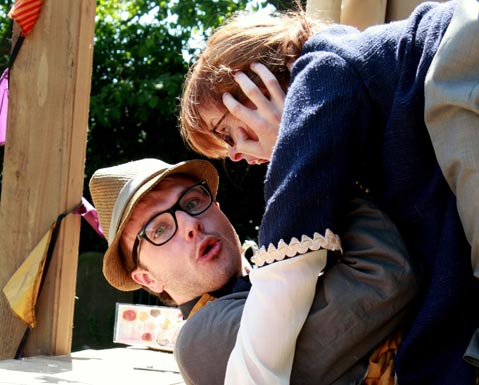The Comedy of Errors by Shakespeare
Shakespeare’s Globe Comes to UCSB

When scholars praise Shakespeare’s plays for their deep insight into human nature, they’re not usually talking about The Comedy of Errors. This fast-paced farce, which revolves around a series of mistaken identities, is widely considered a product of his pre-profundity period.
Rebecca Gatward begs to differ. While directing the ever-popular play for Shakespeare’s Globe in London, she discovered a surprising level of emotional depth.
“There’s an awful lot of slapstick and nonsense,” she noted in a telephone conversation from the U.K. “But I think there’s something rather interesting going on, and the fun of the play should highlight that rather than detract from it.”
Gatward’s critically acclaimed staging, which toured widely around Europe in 2009 and 2010, will make its American debut next week, when UCSB Arts & Lectures presents it for three nights in Campbell Hall. It’s a Jungian take on the classic comedy, one that notes the importance of integrating the light and dark sides of one’s personality.
Loosely based on a farce by the Roman playwright Plautus, The Comedy of Errors is set in Ephesus, a bustling commercial hub in what is now Turkey. The city is home to a somewhat brutish man named Antipholus and his slave, Dromio.
They are ignorant of the fact they have exact twins — also named Antipholus and Dromio — living in Syracuse. When the latter pair journeys to Ephesus, comedic confusion ensues.
Gatward’s production features a cast of only eight actors — a limitation the director turned into a virtue.
“I have one actor playing both Antipholuses, and one playing both Dromios,” she said. “Quite often, when there are two actors playing those parts, they spend most of their time in the rehearsal room trying to be the same as each other. They have to perfect the same voice, walk, mannerisms.
“But I feel strongly that the two characters are incredibly different,” she continued. “They’re sort of like the light and dark of a human being — two sides of one self, in a way.
“With the same actor [playing both parts], you can really pull out those differences in the characters. That’s what the project has been about for me — exploring those differences between them, so there’s a real sense of resolution when they reunite at the end of the play. There’s the possibility they can both draw the positives from each other.”
It’s a familiar theme — and a profound one. “Often, Shakespeare takes his characters on a journey where they learn moderation, or become integrated,” Gatward said. “He obviously explores this theme more fully in his later work, notably Measure for Measure, but it’s there in The Comedy of Errors.”
That said, the primary goal of this play is to amuse. Gatward notes it was apparently written as an after-dinner entertainment at the Inns of Court, a professional association and social gathering spot for barristers. Thus, there are many jokes about lawyers — and the types of people lawyers deal with every day.
Shakespeare’s Globe is the company whose home base is an exact replica of the theater where the Bard premiered many of his masterpieces. Gatward’s Comedy of Errors has played in that unique space, but it was designed as a touring show. As such, it has been performed in a variety of indoor and outdoor settings — including, memorably, a graveyard in Brighton.
“We keep the lights up in the auditorium,” Gatward said. “This allows for actors to speak directly to individual members of the audience. They also make their own music. Three or four of the company members play instruments.”
So there’s a lot going on, and with the actors playing multiple roles, it’s occasionally hard to keep track of who is who. That’s precisely the point, according to Gatward, who sums up this surprisingly substantive show in 10 words: “It’s a comedy of errors within a comedy of errors.”
4•1•1
Shakespeare’s Globe presents The Comedy of Errors, Tuesday-Wednesday, November 8-9, and Friday, November 11. All shows at 8 p.m. at artsandlectures.sa.ucsb.edu/ UCSB’s Campbell Hall. General public, $35-$55; all students, $18. For tickets or information, call (805) 893-3535, or go to artsandlectures.sa.ucsb.edu.



